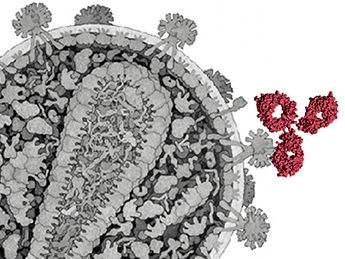People also have antiviral ‘plant defences’
Advertisement
In addition to known antiviral agents such as antibodies and interferons, people also seem to have a similar immune system to that previously identified in plants. This is the result of research carried out by Esther Schnettler with which she hopes to obtain her doctorate at Wageningen University, part of Wageningen UR. Together with the group of Professor Ben Berkhout of the Academic Medical Centre (AMC) in Amsterdam, Schnettler discovered that a protein used by plant viruses to bypass plant resistance can also impair the defence against HIV viruses in people. Schnettler’s findings may open up new opportunities for improving health.
Plants defend themselves against viruses by attacking, deactivating and breaking down genetic material in a process called RNA silencing. Viruses try to bypass this defence by producing proteins that block it. Schnettler researched the functioning of these silencing suppressor proteins in plants, recognising that the improvement of plant defences would enable more sustainable cultivation by reducing the need for chemical pesticides to combat insects and pathogens.
Schnettler also studied whether the silencing suppressor proteins that allow plant viruses to bypass plant defences could also have an influence on our immunity systems. We know that antibodies can detect the protein shells of viruses, which allow them to be broken down. Our bodies also protect themselves against viruses by releasing interferons that give a sign to cells to die, preventing the viruses within those cells from multiplying or spreading.
In cooperation with a group of scientists from the AMC, Schnettler found that HIV mutants which are unable to produce a specific protein (making it almost impossible for them to multiply) can start multiplying up to wild type virus titer levels when a silencing suppressor protein from a plant virus is added. This seems to suggest that people also have the defence against viruses used by plants against intruders and which detects and deactivates the genetic material of the HIV virus.
“The research has helped us to understand that the process of RNA silencing seems to be a widely occurring antiviral defence,” says Schnettler. “Our findings could offer new opportunities for developing antiviral medication. This is not yet certain, however, as the RNA silencing process in the human body has (additional) other functions that must not be impaired by medicines.”
Other news from the department science
Most read news
More news from our other portals
See the theme worlds for related content
Topic world Antibodies
Antibodies are specialized molecules of our immune system that can specifically recognize and neutralize pathogens or foreign substances. Antibody research in biotech and pharma has recognized this natural defense potential and is working intensively to make it therapeutically useful. From monoclonal antibodies used against cancer or autoimmune diseases to antibody-drug conjugates that specifically transport drugs to disease cells - the possibilities are enormous

Topic world Antibodies
Antibodies are specialized molecules of our immune system that can specifically recognize and neutralize pathogens or foreign substances. Antibody research in biotech and pharma has recognized this natural defense potential and is working intensively to make it therapeutically useful. From monoclonal antibodies used against cancer or autoimmune diseases to antibody-drug conjugates that specifically transport drugs to disease cells - the possibilities are enormous

























































